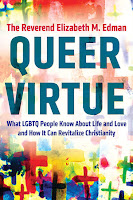Wednesday, December 06, 2017
[queer virtue: what lgbtq people know about life and love...]
Queer Virtue: What LGBTQ People Know About Life and Love and How It Can Revitalize Christianity
The Reverend Elizabeth M. Edman.
Beacon Press, Boston MA 2016
Read more about this book, including praise, a sample chapter, and a free study guide at the publisher's webpage.
sample quotes
For Paul, love was the glue that holds a community together. But that love was never designed to be insular. Rather, the evangelistic impulse is precisely about expanding that sense of love outward both in proclamation and in service to the larger community. This was one of the significant ways that Christianity diverged from Judaism, becoming a community that transgresses ethnic ties, hoping to expand in scope and scale to include those in need throughout the world. (p. 25)
The path of queer virtue looks something like this:
One discerns an identity;
One risks telling oneself and others about that identity;
One engages with others, touches others, to explore that identity;
One confronts and is confronted by scandal;
One lives out one's identity with and through community, looking to the margins to see who is not yet included. (p. 27)
It is good for churches to be inclusive of queer people, but it is not good enough. It is important for clergy to be pastoral to queer people, but it is not enough. What is needed now is a bold, pastoral, explicitly Christian response that does what white antilynching activists were not willing to do with regards to race: rupture the false binaries that are employed to demonize queer identity. It matters that we preach not only that violence is wrong and anti-Christian, but also why it is wrong and anti-Christian. (p. 52)
He taught me a lot that day about the role that straight allies can play in giving cover to us queerfolk as we do this radical, unpredictable work of queering.
Because we need cover for this. Simply naming our perspective as "queer" is more than a lot of parishioners can handle. One of the easiest ways that progressive denominations could ignite interest in the binary-busint aspects of Christian theology would be to fee up queer clergy to proclaim the Gospel from an explicitly queer perspective, boldly and honestly. Let us be ourselves, and assure us that you will have our backs when our proclamation unsettles and afflicts those who are comfortable in a dualistic worldview. (p. 61)
This is one of the ways that Christianity is most thoroughly queer. Everything about Christianity is scandalous, from the inherent shock value of God becoming a defenseless baby, to the cosmic joke by which Rom's most shameful instrument of torture becomes a mechanism for salvation. The centrepiece of Christian worship is Holy Communion, where we share bread and wine that for some Christians represent Jesus's body and blood and that for Catholics actually become Jesus's body and blood. If the cannibalistic overtones don't make the case plainly enough that we are about scandal, try this on for size: the word "Communion" comes from the Greek word koinonia, which means "common." In Jesus's time, it also meant "defiled." (p. 82)
The most authentic social justice ministries exact a price even as they cultivate joy. That's because hospitality requires that one confront scandal. We have looked at numerous biblical passages in which Jesus had to deal with being scandalous or scandalized. What we didn't talk about were the many passages in which Jesus scandalized his contemporaries simply by occupying the same space as people who were considered unclean. And he didn't just occupy the space - he touched people. Touching someone who is considered unclean means you get contaminated - ritualistically, socially and sometimes physiologically as well. This means that Jesus took on the state of being unclean, and he took on whatever stigma was applied to the people he was engaging: women, children, Samaritans, lepers, you name it. In other words, Jesus's work meant that he constantly scandalized people by becoming a scandal to them. And he did this at the exact moment when he was doing the kinds of work that Christians are often trying to emulate when we engage in outreach or social justice ministries. (p.160)
Set of five videos. Watch on YouTube.
Subscribe to:
Post Comments (Atom)


No comments:
Post a Comment